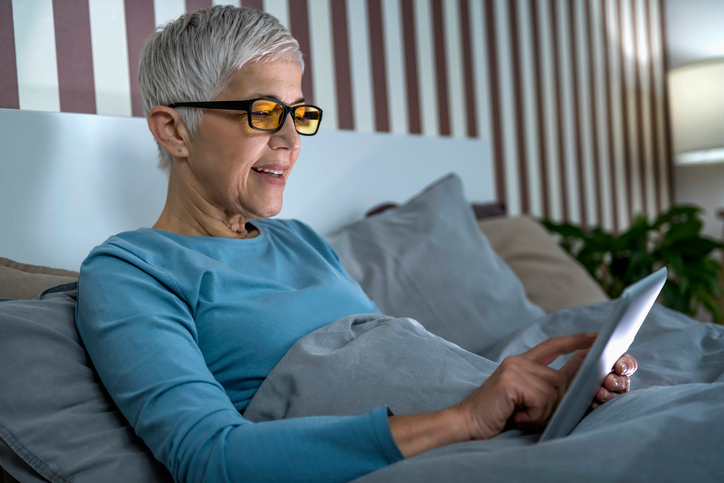Commitment + Clinical Leadership = Better Outcomes

How Blue Light Affects Your Sleep
Do you scroll through your phone before going to bed? Maybe you also work on a computer during the day, where you have to look at screens for over six hours.
You might not realize it, but the light from your phone and other electronic devices may be impacting your ability to get a good night’s sleep. This is because electronics emit blue light wavelengths, which affect the brain’s natural sleep cycle by tricking the mind into thinking it is daytime.
Here is how blue light impacts your sleep, as well as some ways that you can work to avoid blue light around your bed time.
What is Blue Light?
Blue light is one of the colors our human eyes can see, yielding the shortest wavelength but also producing the highest amount of energy. Blue light is visible to everyone, and the biggest source of blue light is the sun.1
Simply put, blue light is one of the many colors you can see. Other common light wavelengths are colors that you already know, including red, green, yellow, orange, and violet.2 All of these colors have different wavelengths and energy levels.
Blue light is also the reason why the sky is blue.3 The blue light wavelengths collide with the air molecules, which causes us to see the blue color.
Many everyday objects that you use in your daily life emit blue light, including:
- Televisions
- Phones
- Computers
- Tablets
- Gaming systems
- LEDs
- Florescent Lights
How Blue Light Affects Us
There are both positives and negatives when it comes to blue light. According to Harvard Health, some of the benefits of blue light include:4
- Alertness
- Improved memory and cognitive functioning
- Regulating your circadian rhythm, which is your body’s internal sleep clock
- Elevating your mood
Having expected doses of exposure to blue light is essential to keeping your body healthy. In fact, UCDavis states that not being exposed to enough of blue light during childhood can inhibit the eye’s development and lead to myopia.
However, like anything else, too much blue light can affect your body negatively, such as:1
- Damage to your retinal cells
- Cataracts
- Eye cancer
- Growths on the clear part of our eyes over the white covering
- Digital eyestrain
This makes blue light in excess dangerous, and children are especially susceptible to blue light as they develop.
Blue Light Exposure and Sleep
When the sun goes down, it gets dark, which is when we are naturally supposed to sleep.
However, we live in a world where we can continue to stay up even during the darkest hours of the night. Some activities you may do in the evening include watching television, browsing the internet on your phone, or playing app games on your tablet.
The blue light from our electronic devices and lights can disrupt sleep because it interferes with the body’s natural sleep cycle.
Exposure to blue light can reduce the amount of melatonin your body produces, which is a hormonal gland that regulates our sleep-wake cycle. Melatonin levels are supposed to naturally rise as you sleep and fall as you wake, but blue light decreases the secretion of melatonin.
A study looked at the effects of 6.5 hours of exposure to blue light versus green light, and blue light suppressed melatonin levels for twice as long and doubled the body’s natural circadian rhythm from three hours to one and a half.5
Over-exposure to blue light might be keeping you awake at night and disrupting your sleep cycle. If you feel tired, fatigued, or sluggish throughout the day, blue light could be one of the reasons you feel as though you aren’t getting enough sleep.
Reducing Blue Light Exposure
Now that you know what blue light is and how it can affect your sleep cycle, you can actively take steps to reduce the amount of blue light that you are exposed to.
Here are some tips to help you reduce blue light:
- Turn off electronics an hour before bed. When you are getting ready to go to sleep, turn off your electronic devices. Try doing activities such as reading a book, creating artwork, sewing, or something that does not involve the use of an electronic device before you sleep.
- Take breaks from looking at your screens. To help yourself sleep better, take regular breaks from looking at your computer screen throughout the day. For example, if you work on a project for thirty minutes, take a short three to five minute break to look at something other than the screen.
- Use nighttime settings. Many different devices offer nighttime settings to help reduce the amount of blue light exposure. For example, some phones have a nighttime mode or ways that you can disable blue light filters. Look up your phone’s make and model, or check your phone’s display options to find out if you can adjust the blue light settings.
- Purchase blue light glasses. There are glasses that are designed to help mitigate the effects of blue light. Try wearing a pair in the evening to help protect your eyes from the blue light wavelengths.
Get a Good Night’s sleep today!
Now that you know what blue light is and how it affects the body’s wake and sleep cycle, you can start reducing the amount of blue light that you are exposed to throughout the day. This can help improve your sleep, which will increase your productivity and alertness throughout the day.
To learn more about getting better sleep, visit the National Sleep Foundation’s website.
Saber Healthcare is an organization dedicated to providing consultant services to long term care providers. This article is for informational purposes and is not meant to be seen as professional advice. Please consult with a medical expert before relying on the information provided.
Sources
- https://health.ucdavis.edu/health-news/newsroom/is-blue-light-from-your-cell-phone-tv-bad-for-your-health/2019/05
- https://www.webmd.com/eye-health/what-is-blue-light
- https://blutechlenses.com/blog/what-is-blue-light/
- https://www.health.harvard.edu/staying-healthy/blue-light-has-a-dark-side
- https://www.reviewofoptometry.com/article/living-with-blue-light-exposure
